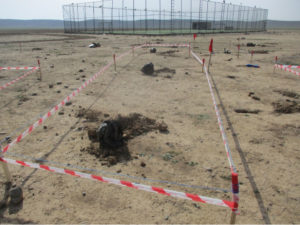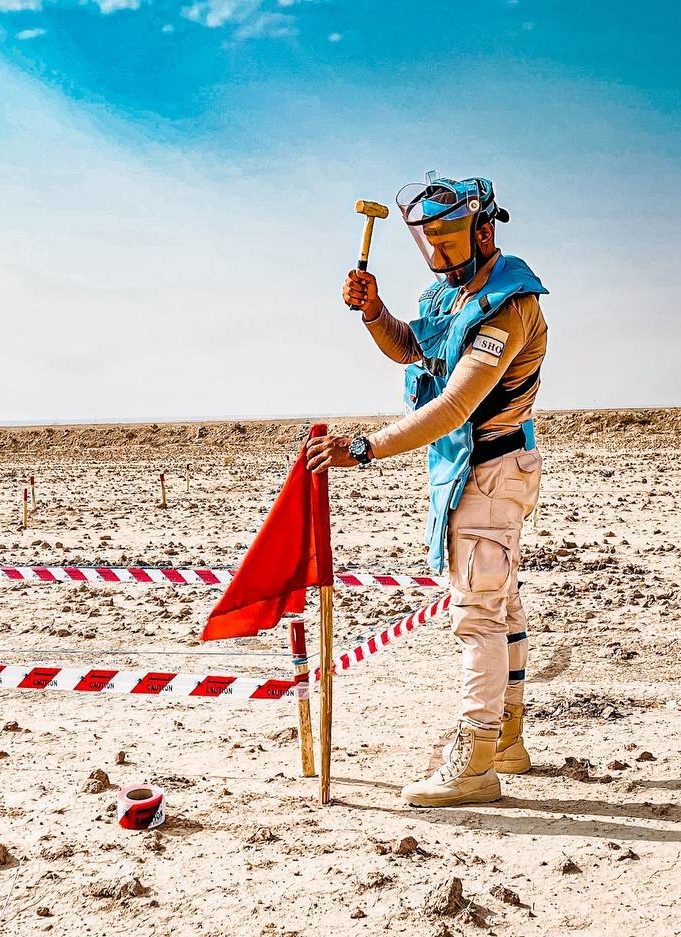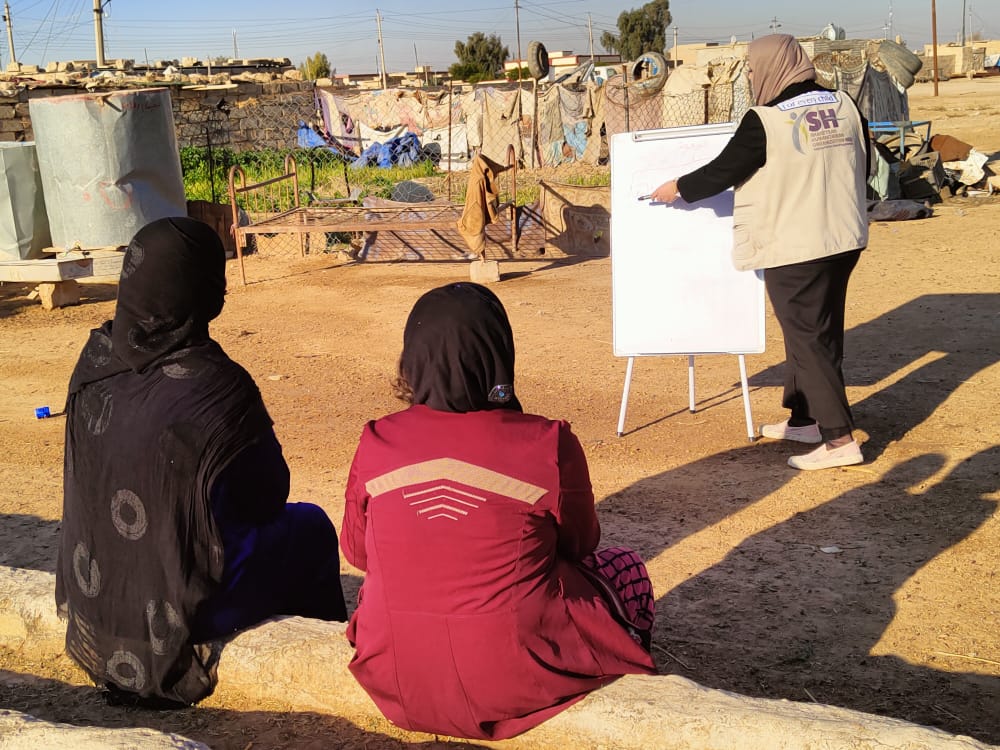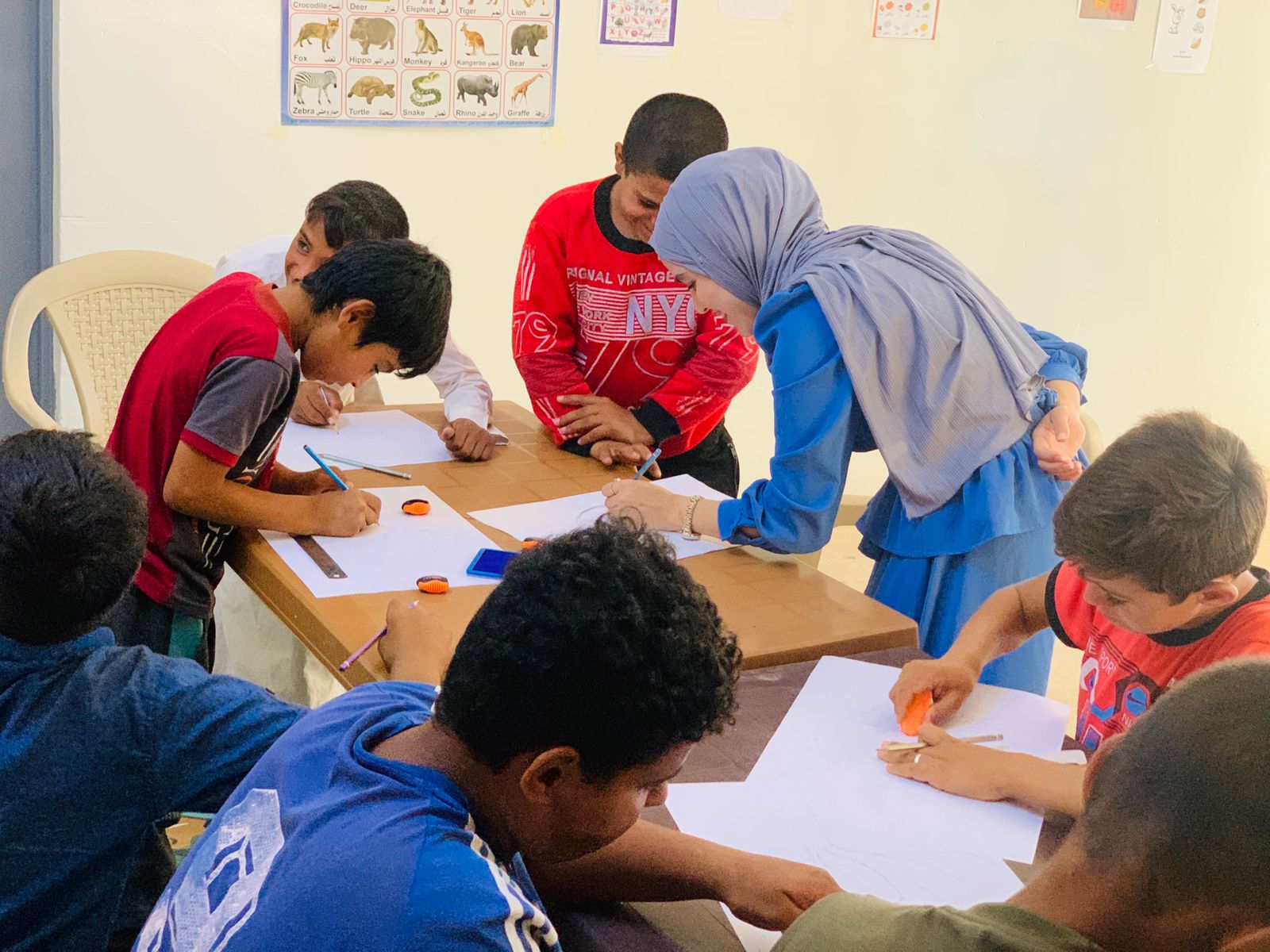
IEDs surrounding the football pitch in Sultan Abdullah Village, 20 March 2022.
The inhabitants of Sultan Abdullah Village in Al-Qayyara Sub-District have suffered many hardships over the past decade. As an ISIS-held village on the front lines, Sultan Abdullah Village was severely damaged as the battle waged. Insurgents ruthlessly planted improvised explosive devices (IED) in houses and fields to target the advancing anti-ISIS coalition, as well as to keep the remaining villagers from fleeing. Many did so nonetheless, and the severe contamination of homes and farmland prevents them from returning to their village after the end of the conflict.
One of the most glaring signs of Sultan Abdullah Village’s continued distress was its unused football pitch. A recreational area that is highly frequented in most towns in Iraq, the local football field in Sultan Abdullah Village and its surrounding areas remained vacant and inaccessible due to its severe contamination with IEDs.
Sultan Abdullah Village lies about 54 kilometers south-southeast of Mosul. It is part of Mosul District in Nineveh Governorate. In early 2014 the village had about 1,500 inhabitants, mostly farmers and shepherds as well as some members of the Iraqi Security Forces. Sultan Abdullah’s bucolic charm was disrupted brutally on 10 June 2014, when ISIS fighters invaded the village and began setting up their repressive regime. Many villagers were killed, especially those with connections to the Iraqi Security Forces; their houses were destroyed and contaminated with IEDs. The violence and repression became so unbearable that almost all of Sultan Abdullah’s inhabitants left their homes and slipped out of the village. As a frontline village, more ISIS fighters began to move into Sultan Abdullah Village. Living among the remaining villagers, the insurgents dug trenches and erected an embankment, and secured these defensive positions with IEDs to target both advancing security forces as well as fleeing villagers. During the battle to re-take Sultan Abdullah Village, many buildings were damaged or destroyed. ISIS fighters laid further IED belts to force the village’s residents to remain in Sultan Abdullah during the fighting, which lead to civilian casualties.
On 20 October 2016, the village was finally liberated by the Iraqi Security Forces. However, the presence of numerous explosive remnants of war prevented many villagers from returning home. Even after ISIS had left, incidents with animals and humans continued. Local authorities recorded four EO accidents involving humans, which led to the death of one person and the injuring of three others; the last incident occurred in December 2021. Moreover, an IED explosion damaged a tractor in the same month. In addition, two animal accidents were recorded in the village.
Aside from contaminating buildings within Sultan Abdullah Village and is surrounding areas, included a road linking the village of Sultan Abdullah to its neighboring village of Tel al-Reem, ISIS fighters also laid IEDs around Sultan Abdullah’s football pitch. The playing field was erected in 2014 at the cost of USD 50,000 and attracted about 100 visitors every day before the invasion of ISIS. The lack of access to the only recreational and sporting facility in the area was a burden particularly for the children and youth in Sultan Abdullah. As one resident, Mrs. Atyaf Assi Matar (32) explained: “I was afraid for my two children because of the explosive hazards in the village. I always warned my sons and kept them from going to the contaminated lands because I was so afraid for them and so that no harm would happen to them. […] The people in the village and my sons were heavily impacted by this, as the football pitch is the only recreational and sports place for them.”
After receiving the task order from Iraq’s national Mine Action authority, the Department of Mine Action (DMA), SHO, with mentorship from FSD, began conducting manual clearance in Sultan Abdullah Village. One manual clearance team was deployed to the area around the village’s football pitch to clear the hazard area. SHO cleared a total of 6,253 SQM and rendered safe 16 victim-operated IEDs as well as one UXO in the process.
One of the deminers, Mr. Thanoun Ahmed Younes (22), is from Sultan Abdullah Village. He and his family were forced to flee when ISIS occupied the village. When they returned to the after its liberation, Thanoun was surprised by the presence of EO near his house, in their agricultural lands, and even near the football field in the village. This experience encouraged Thanoun to start working with FSD as a deminer, before moving on to SHO in the same role. He is proud to clear his village of explosive ordnance that have caused so much hardship for his family and neighbors: “I am very excited to clear the contaminated areas and to help the people of my village to return to their normal lives.”
With the EO removed from the ground, the lands surrounding the playing field are now safe, allowing residents of the village to slowly return to their normal lives by farming, herding sheep, and using the road linking the villages of Sultan Abdullah and the neighboring village of Tal al-Reem, in addition to practicing sports and recreational activities in the football pitch, which has become safe and usable.
The clearance of Sultan Abdullah Village’s football pitch only required one team of well-trained and equipped deminers and a few days of work, but for the villagers in the area it had a huge impact. Mrs. Lamia Younis Ahmed (22), who lives in the village of Sultan Abdullah with her family near the stadium, explained: “After the liberation of our village on 20 October 2016, we did not return to our house because the explosive devices and war remnants were still present. After Shareteah Humanitarian Organization (SHO) came and the clearance team started clearing the land we decided to go back to our house, and today we live in safety and stability.”
While it is still too soon to fully assess the impact of clearance operations on the lives of village residents, positive developments have already started to occur. Displaced families are returning to Sultan Abdullah Village, the road to the neighboring village of Tel al-Reem has been opened and is being used, and villagers are frequenting the football pitch once again. Residents of Sultan Abdullah also pointed out that the contaminated area was close to electricity poles, some of which contain electrical transformers. These were impossible to maintain due to the presence of IEDs in the area, but are now once again accessible for repair and maintenance.

The football pitch has been rehabilitated and is once again a playground for the local population.




